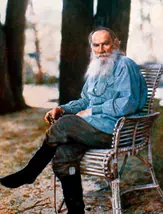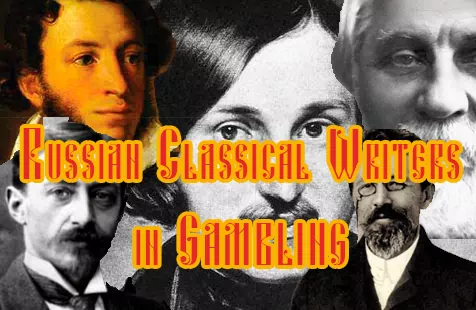At school, even if they told us this, they tried not to emphasize attention. For educational purposes. The truth is, almost all Russian classical writers, whose portraits are hanging in schools, whose names are streets and cities, were ludomancers of varying degrees of severity. From simply tough, to those who created masterpieces in the putty.
So:
Fyodor Mikhailovich Dostoevsky
Ludoman mad, internationally recognized. Played in roulette like crazy. Lost everything to the last penny. His, alien, last! He played mainly in gambling establishments in Germany.
Moreover, as follows from his letters, the classic at one time poured money according to the well-known pseudo-winning system, according to Martingale. He waited for an attack of one color three times in a row, after which he began to bet on the opposite color, doubling when losing. It is clear that everything merged in the end.
Most of his brilliant works are the result of rampant ludka. Having lost to pieces, having received enormous debts - in F.M.Dostoevsky the quality characteristic of many ludomania was included. "Crime and Punishment" as it appeared? Yes, very simple. Fedor Mikhailovich pledged all the money, and urgently needed money to continue. I picked it up and wrote it. And so with almost all the other books.
This definitely classic literature has a book dedicated only to the game. It is called the “Player”. It is written from itself.
There is a small nuance in the book, which readers can demonstrate in society by exposing themselves as profound experts in literature.
The fact is that the entire book "Player" is built around the game of roulette. French roulette. The question is, and on what did the main character of the “Player” finally raise the money before falling into a tailspin of a final and deepest putty?
99% who read the book will answer "at roulette." And wrong. When the main character hit the jackpot, he completely ruined the roulette table for which he played, and then went on to play on the table for trente-et-quarante (30 and 40). This is an old French card casino game, used to be very popular in Europe. Now almost everyone has forgotten about it, you can find a kind of current in Monte Carlo in modern days.
So the conclusion is paradoxical. No matter how evil gambling is, the world would not see many famous works if Fyodor Mikhailovich wouldn’t be ludicrous.
Alexander Sergeyevich Pushkin
"Our All" Alexander Sergeyevich, loved to play. Card game scenes appear in many of his works. And in “The Captain's Daughter” we can find the scene of gambling on billiards.
In reality, by the way, Alexander Sergeyevich loved to play not only cards, but also life. +20 duels, confirmation of this. And once he challenged him for being accused of a cheating game.
Pushkin has a well-known work, the plot of which is entirely built around gambling. This is the Queen of Spades.
In addition, Alexander Sergeevich many stories revolve around the game with human life. I recommend the story "Shot". Card gambling escalated into a duel due to hypertrophied notions of honor. Such was the literary intent of the writer. The duel was a kind of continuation of the card game.
There is a strong moment in the story when one of the participants in the duel has breakfast of sweet cherries at gunpoint, which must be fired. Taken from real life, from the life of Alexander Sergeyevich himself.
A.S. Pushkin was a player in the full sense of the word. Not a trickster, namely a player with a capital letter. A man who was not afraid to bet not only money, but also his own life. Including, and for the sake of protecting the honor of those close to him. For which we actually remember him.
Lev Nikolayevich Tolstoy

Lev Nikolaevich was a noble gambler. As an officer in the military service, according to rumors, he managed to lose once and then win back his family estate.
You can believe it or not believe it, but it is enough to read the works of Leo Nikolaevich to understand. Man knew what putty was from his own experience. A person who does not know does not write like that. The scene of a tense card game is present in War and Peace (Rostov - Dolokhov).
Leo Tolstoy has a work that immerses the reader even more fully in the world of excitement of that time. This is Two Hussars. It begins with the scene of the card game and the deepest putty, which has been going on for 4 days in a row. Moreover, the game of one of the heroes already goes to the treasury money issued to him in the account. Who has not read, we recommend reading.
Nikolai Vasilievich Gogol
It is not known how much Nikolai Vasilievich himself liked to play. But gambling is present in his works. The well-known "Inspector General" begins with the fact that the main character Khlestakov was stuck in a provincial city precisely because of a card game. It was completely lost and there was no money for the further journey.
Also, Nikolai Vasilievich has a work entirely devoted to gambling, the play "Players". Who did not read, we advise. Quite an interesting story about 19vv card cheaters, and the tricky "double" wiring. The play also describes various methods of cheating.
Nikolay Alexeyevich Nekrasov
Nikolai Alekseevich stands out from a number of other Russian classical writers - players. First of all, because he was a pro-gambler. That is, a person earning a game of cards for a living.
Nikolai Alekseevich played whist and preference beautifully, the games are quite complicated. He began to play in taverns and dubious dens of Petersburg. And gradually "rose in limits" to the gambling tables of the "English club".
English club - was a very closed and very prestigious club. It was almost impossible for a person to get there from the street. And the point is not only that the game was played at very high rates. In the "English Club" spent all the serious personalities of the then Petersburg.
Thanks to gambling and connections in the English club, N.A. Nekrasov sponsored the literary magazine Sovremennik, founded by A.S. Pushkin.
Nikolai Alekseevich not only paid for the publication of the magazine, but also periodically paid bribes to censors (literary ILV technical time) so that they would not find fault with the content of the magazine. Bribes were transferred to the same English club. The mechanics of the transfer of money are not exactly known, but perhaps Nikolai Alekseevich “merged” the money in the game with the then censors and civil servants.
This is another example of how gambling contributed to the flowering of world-famous Russian classical literature.
Solomon Naumovich Rabinovich (Sholem Aleichem)
A writer who is considered a classic of both Russian and Jewish literature. The United States also considers him a great American writer. At the same time, Sholom Aleichem lived most of his life in the territory of modern Ukraine, in the territories that were then part of the Russian Empire.
The writer has monuments in Kiev and Moscow. In theaters on Broadway in New York, a musical based on his works Fiddler on the Roof has been going on for almost 55 years. In 1971, based on a musical in the United States, a film of the same name was shot, which received three Oscars. Performances of his works are in Ukraine, Russia, England, USA and Israel.
5 years ago, at the age of 103, the granddaughter of Sholom Aleichem, Bel Kaufman, known to Soviet readers in the novel “The the Up Staircase” about the life of a school in the New York ghetto, died in New York.
Sholem Aleichem was a passionate card player. He loved to play the gambling card game "66". Unfortunately, his passion for gambling led him to a rather difficult Ludomanian continuation - a game on the Odessa Stock Exchange. Inexperienced trader Sholom Aleichem completely went bankrupt, having lost almost all his fortune. In the future, he had to earn a living exclusively in literary work in order to make ends meet. But Russian and world literature was enriched with new masterpieces.
In conclusion of the article, we note that gambling in Russian classical literature was often associated with the lifestyle of heroes, their fatalism.
Gambling was just a literary tool demonstrating how a person plays with his own destiny. That is why Russian classical literature is full of scenes of gambling and duels, where the game is played not against the enemy, but with one’s own life. Which was reflected in real life. No wonder “Russian roulette” is called “Russian”.
As for the “production novel about gambling,” among the well-known Russian works of this genre there is none. But there is in the west.
“Let Fools Die” (Fools Die) is a classic production gambling novel of 1978, written by Mario Puzo, the legendary author of The Godfather. We recommend reading to those readers who want to plunge into the atmosphere of gambling Las Vegas 70s.
by TRIFONOFF
